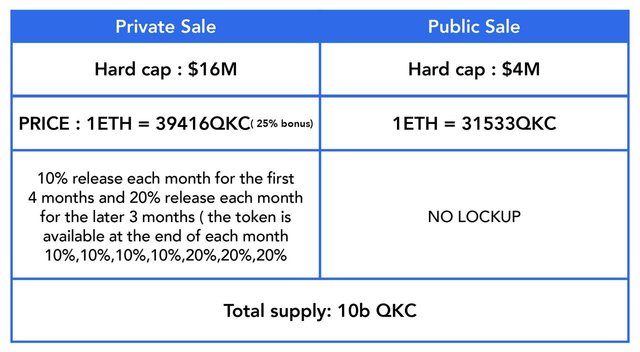Quark chain, Another next gen blockchain?

Quark Chain
So you may have already heard of upcoming third-gen blockchains like EOS, Zilliqa, and Cardano. All this started with the first and blockchain like bitcoin which revolutionized the currency and store of value, it uses proof of work to maintain the public ledger called blockchain, the second-generation blockchains mainly Ethereum developed smart contracts which shrank the gap between population and blockchain currently Ethereum has a market cap of $ 65 billion and there are many decentralised applications made on top of Ethereum's blockchain. But there are some drawbacks in first-generation and second-generation blockchains. With the bitcoin's transactions becoming more costly and slow as more and more people joining the space and Ethereum's network congestion, low TPS and sometimes becoming unstable.
There is a lack of scalability in first and second generation Blockchains. Now some third-generation block change is entering into space to remove that scalability issue, quark chain is one of the third-generation blockchains that aims to support over the 100,000 transactions per second to 1 million transactions per second. Now that seems a bit far-fetched for now, but they have this unique model of two-layered blockchain in which there is a root chain and within each block, there are various sharding layers we will discuss more this later in this blog but first let me tell you about sharding it is the same process used by Zilliqa blockchain, but Quark Chain is using a different approach to achieve the same.

Sharding
Now what is Sharding?
Currently the theory and bitcoin users proof of work for validating all the transactions taking place on the network. If you ask me proof of work is a great and secure method but it has some drawbacks like low throughput and slow transactions. Currently Ethereum is proof of work based but in future Ethereum will support sharding and shift to proof of stake, but nobody knows how soon.
Sharding is a new kind of validation protocol it includes a group of people (1 Shard) to validate transactions created by user instead of everyone participating to validate transaction there are different shards to validate transactions by dividing groups into shards the speed of validation increases, sharding flexibility of the network, the network still remains fairly secure. Quark chain is also using sharding but they are using a different approach with a two layred blockchain structure

What is Quark chain then?
Quark chain is designed to scale while ensuring security at the same time it will support various decentralized applications. It will also allow current decentralized application built on Ethereum to move onto quark chain's blockchain. So we can say quark chain will be decentralised, secure and fast. As mentioned on their website the current transactions per second they are getting as tested on the testnet is 2279.37 transactions per second which are incredible now compare that to 4 transactions per second and bitcoin and 10 transactions per second in Ethereum. Quark chain aims to get more than 100,000 transactions per second. To put this in perspective visa currently 45,000 transactions per second (The data from Aug 2016).
Quark chain network contains elastic Sharding layers which contain a list of minor shards. Each of them possessing a small set of transactions independently. So as the number of shards increases the capacity of the system also increases also the transactions per second.
Quark chain network has a root Blockchain called a root chain which confirms all the blocks from Sharded blockchains. The root blockchain does not process any transactions, but the bloke has significantly strong difficulty so that reverting any transaction is not economically efficient.

| Layer | Chain Name | Block name | Interval | Main Function |
|---|---|---|---|---|
| Rootchain Layer | Rootchain | Root block | In minutes | Confirmation |
| Sharding layer | Shard | Minor block | In seconds | Ledger |
- The system of quark chain network has eight minor block chains with the target block duration of 10 seconds and the Root blockchain with the target block duration of 150 sec.
- The heights of all minor blockchains are about 3800 seconds, and they are very close to each other their block time intervals are very close to 10 seconds that means all minor blockchains are mined evenly and the system throughput is about eight times more than the single sharad case.
- The 50% has power allocation is on the root chain of quark chain network. Besides scalability, it helps in enhancing the security and decentralization of the network.
- In order to stop double spending attacks 50% of the overall has power is protected by quark chain network and attacker requires at least 25% of hash power. You might think this is smaller than single block chains like bitcoin's 50% but since the network of quark chain is more decentralised it will be much harder for a miner to collect 51% hash power in Quark chain.
- There are two types of transactions that can be performed on quark chain network-
- In-Sharad Transactions- The transactions where the input and output addresses are in the same Shard. These types of transactions are simple because the shard already contains complete Ledger information.
- Cross-Shard Transactions- The transaction where the input and output addresses are in different Shards. These type of transactions are more difficult than In-Shard Transactions as the two Shards had to be completely synchronised in order to perform transactions. These transactions can be confirmed in minutes to scale the throughput of cross-shard transactions we had to scale the number of shards. Transactions can be scaled linearly as the number of shards increases.

- Cross-Shard Transactions- The transaction where the input and output addresses are in different Shards. These type of transactions are more difficult than In-Shard Transactions as the two Shards had to be completely synchronised in order to perform transactions. These transactions can be confirmed in minutes to scale the throughput of cross-shard transactions we had to scale the number of shards. Transactions can be scaled linearly as the number of shards increases.
QKC



First things first if you belong to any of the following countries you won't be able to participate in the ico-
- USA
- China
- New Zealand
- Canada
- Cuba
- North Korea
- Serbia
- Tunisia
- Somalia
- Zimbabwe
- Congo
- South Sudan
- Sudan (north)
- Sudan (Darfur)
- Turkey
- Iran
- Iraq
- Libya
- Syria
- Ethiopia
- Yemen
- Sri Lanka
- Venezuela
Now for those of you who are not a part of these countries you have to perform a KYC in order to be eligible to participate in ICO. And in order to start KYC process you have to be a part of either English or Chinese telegram group
Link to telegram group - https://t.me/quarkchainio
After joining the telegram group you need to message bot with username @quark_kyc_bot . Now be careful people might try to scam you pretending that they are the official KYC people form quark chain.
Now the port will give you a unique code that you will need in order to participate in KYC. The bot will also give you a link to the KYC registration.
Once you open the link you have to enter the also have to enter your first name, last name, nationality, date of birth, unique identification like passport, proof of residence, you also have to click a picture of yourself holding your photo ID and a piece of paper with current date and quark Chain written on it.
You also have to provide your Ethereum address. Please make sure that it's not a exchange address you can use metamask or myetherwallet etc. Beware of Pishing. Double check the URL.
Read the white paper and all terms and conditions and you're good to go.
Happy investing in high throughput third-generation blockchain the Quark Chain
This post has been rewarded with 30% upvote from @indiaunited-bot account. We are happy to have you as one of the valuable member of the community.
If you would like to delegate to @IndiaUnited you can do so by clicking on the following links: 5SP, 10SP, 15SP, 20SP 25SP, 50SP, 100SP, 250SP. Be sure to leave at least 50SP undelegated on your account.
to get community support and guidance
Please contribute to the community by upvoting this comment and posts made by @indiaunited.